
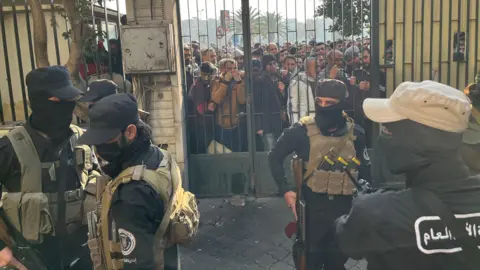 Amer Pirzada/BBC
Amer Pirzada/BBCOn the night of December 6, Muhammad al-Naddaf, a soldier in the Syrian army, was at his post in Homs.
As rebels led by Hay'at Tahrir al-Sham advanced into the city, days after seizing Aleppo and Hama in a lightning attack, Mohammed decided he did not want to fight.
He said: “We had no orders and no information. I took off my military uniform, left my weapons, and headed to my village in Tartous.”
At approximately the same time, Muhammad Ramadan was at a location on the outskirts of the capital, Damascus.
“There was no one to give us orders. Many of our leaders had fled before us. So I thought, why should I die and fight for someone who didn't even give me enough salary so I could feed my family?”
“For our daily rations as soldiers, we only got one egg and one potato.”
The next morning, he also left his post and returned home.
The soldiers' testimony provides insight into the rapid collapse of the regime of ousted President Bashar al-Assad.
For many of his demoralized and underpaid troops on the ground, the speed with which their defense disintegrated in the face of the rebel onslaught was no surprise.
Many soldiers told us they were earning less than $35 (£28) a month and had to do other jobs to make ends meet in a country where this only covers a fraction of basic living costs.
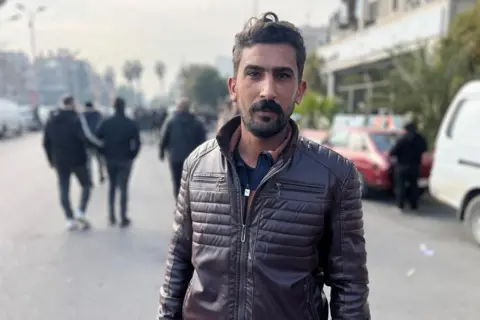 Amer Pirzada/BBC
Amer Pirzada/BBCMuhammad Ramadan was holding the Kalashnikov rifle that had been previously allocated to him when we met with him and others in Damascus more than two weeks after the fall of the regime, at the “Reconciliation Center” run by Hay’at Tahrir al-Sham.
At the centre, former army, police and intelligence officers, as well as anyone who was part of pro-Assad militias, can register for a temporary civil ID card and deposit their weapons.
Hay'at Tahrir al-Sham announced a general amnesty for those who worked in the previous regime.
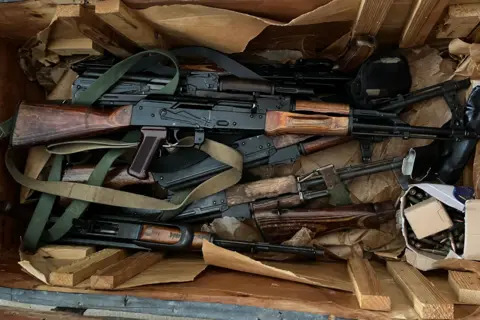 Amer Pirzada/BBC
Amer Pirzada/BBCWalid Abd Rabbo, one of the members of the group supervising the reconciliation centers in Damascus, said, “The goal is to return the weapons issued by the previous regime to the state, and for force members to obtain a civilian identity.” So that they can be reintegrated into society.”
Under Assad, conscription into the army was mandatory for adult males. Recruits had to surrender their civilian ID cards, and were given military ID cards instead.
Without a civil ID card, it will be difficult to get a job or move freely in the country, which partly explains why tens of thousands have come to the centers in different cities.
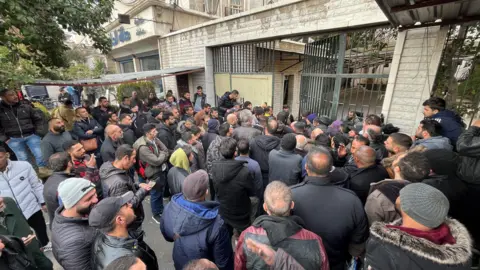 Amer Pirzada/BBC
Amer Pirzada/BBCAt the center in Damascus, which was formerly an office for Assad's Baath Party, hundreds of men were gathering at the gate, eager to be let in.
Many of them were keen to distance themselves from the regime's crimes.
Muhammad Al-Naddaf said, “I did not participate in any of their bad deeds. I consider them despicable acts. I did everything so that I would not be part of the massacres and crimes against the Syrians.”
“I even tried to leave the army twice because I knew I was on the wrong side. But there was no way I could escape. The army had all my civilian documents.”
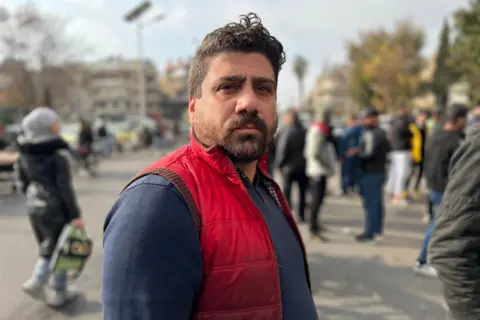 Amer Pirzada/BBC
Amer Pirzada/BBC“Most people don’t know anything, okay? As for me, I don’t know what happened in Saydnaya or any of the prisons,” said Sumer al-Hamawi, who served in the army for 24 years.
The BBC cannot independently verify their claims.
Anger was also evident at the decision of the regime and Assad to flee to Russia on December 7 as the rebels approached Damascus.
“He (Bashar al-Assad) took a lot of money and fled. He left all these people, all of us military personnel, to face our fate,” Sommer said.
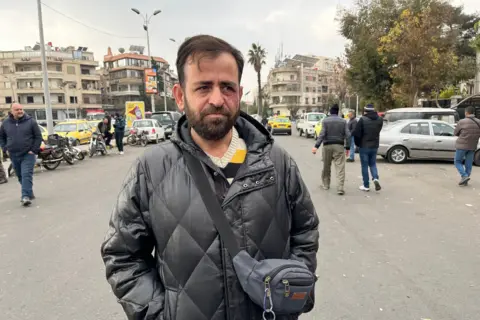 Amer Pirzada/BBC
Amer Pirzada/BBCThere were many worried faces among the crowds at the reconciliation center, but the environment seemed relatively friendly despite the 13-year civil war that has left more than half a million dead.
Muhammad al-Naddaf said: “Everyone told me that the situation was safe, and that I should go and settle in the center. The safety guarantees provided by Hay’at Tahrir al-Sham made a big difference.”
But from different parts of Syria, reports are increasingly coming of suspected revenge attacks involving murder, kidnapping and arson. There are no reliable statistics confirming the number of attacks that occurred, but dozens of them have been reported on social media.
Last week, three arbitrating judges in property matters were killed in the former regime-controlled town of Masyaf in northwestern Syria: Munther Hassan, Muhammad Mahmoud, and Youssef Ghanoum. Sources from the hospital where their bodies were examined told the BBC that they were beaten with a sharp object in the head.
We went to Al-Amriya village to visit Munther Hassan's house. It was bare and cold and looked like it needed repairs.
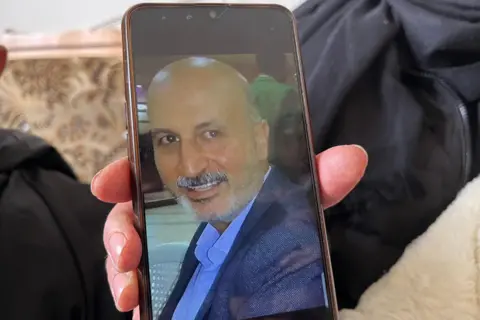 Amer Pirzada/BBC
Amer Pirzada/BBCMunther's wife, Nadine Abdullah, told us she believes her husband was targeted because he was from the Alawite sect, the minority sect from which the Assad family hails, and to which many of the former regime's political and military elite belong.
“Since they were civil judges, not criminal, I think they were killed simply because they were Alawites. Not all Alawites benefited from Bashar al-Assad. Those who worked for the regime had to follow orders, otherwise brutal measures would be taken.” “It was imposed on them,” Nadine said.
Munzer's brother, Nazir, said: “This is a crime against an innocent person. It is unacceptable. Those who were killed had no connection to the regime's politics. They were only working to support their poor families.”
Munther was the father of four young children, and was the sole breadwinner in his family, and he also took care of his sick father and brother.
His family said they are speaking out because they want to prevent such deaths in the future.
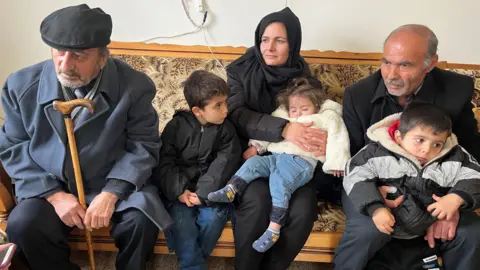 Amer Pirzada/BBC
Amer Pirzada/BBCNadine said: “Everyone says that Hay’at Tahrir al-Sham did not commit the crime. But as the ruling authority now, they must find out who did it. They must ensure protection for all of us.”
The interim government of Hay'at Tahrir al-Sham condemned the killing of the judges and said it would find the perpetrators. She also denied involvement in any revenge killings.
Protests were held in Masyaf after the killing of the judges, and many Alawites told the BBC they were now concerned for their safety.
While Hay'at Tahrir al-Sham announced an amnesty for Assad's forces, it also said that those involved in torture and killing would be held accountable. It will be difficult to achieve this balance.
A few weeks after the fall of the regime, it is a sensitive moment for Syria.
Additional reporting by Aamir Pirzada and Sanjay Ganguly.








